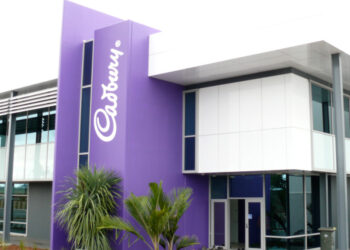- Cadbury’s Q2 2023 financial results reveal a substantial downturn, with a pre-tax loss of N19.473 billion, marking a staggering year-on-year decline of approximately 1,833%.
- The pre-tax loss is attributed to the adverse impact of exchange rate fluctuations, leading to significant unrealized losses and a notable year-on-year surge of about 1,803% in the company’s net finance cost.
- The substantial downturn resulted in Cadbury’s earnings per share (EPS) plummeting to a negative value of (9.58), marking the worst EPS recorded in the last five quarters.
Cadbury has just released its Q2 2023 financial results, revealing a substantial downturn in performance.
The company reported a pre-tax loss of N19.473 billion, marking a staggering year-on-year decline of approximately 1,833%.
Consequently, the earnings per share (EPS) plummeted to a negative value of (9.58), the worst recorded in the last five quarters.
The financials’ accompanying notes shed light on the reasons behind the loss, attributing a significant contributing factor to adverse exchange rate fluctuations and resulting unrealized losses.
These unrealized gains or losses are a result of changes in exchange rates on open financial positions that have not yet been settled.
This situation led to a substantial increase in the company’s net finance cost, amounting to N20.992 billion, signifying an alarming year-on-year surge of about 1,803%.
The notes to the financials also highlight a distinct movement in short-term borrowing, with the loan book experiencing significant growth of 109.32% to reach N49.945 billion in H1 2023.
Additions to import finance facilities and exchange losses on intercompany loans played a role in influencing this growth.
The recent increase in the benchmark interest rate (MPR) by 25 basis points to 18.75%, along with the surge and volatility in exchange rates, may exacerbate the impact of the exchange difference and put more pressure on the company’s bottom line for the remainder of the fiscal year.
The Q2 financial performance of Cadbury is likely to impact investor sentiment. Following the release of the Q2 2023 results on July 26, 2023, the share price experienced a sharp drop of 10% from its previous close, settling at N15.30 per share compared to N17 per share.
Over the past four weeks, the company’s share price has experienced a decline, losing 11% of its value.
Furthermore, the current share price is trading at a significant 18.62% below its 52-week high of N18.80, which was recorded on June 20, 2023.
However, despite these recent declines, the share price has demonstrated positive growth over the year so far, as reflected in the Year-to-Date (YtD) gain of 28.6%.
But the fluctuations in share price would indeed impact its valuation. Currently, the trailing twelve-month (TTM) price-to-earnings ratio for Cadbury’s stock is 12.76x, calculated based on the EPS (TTM) of N1.33.
This means that investors are willing to pay approximately 12.76 times the company’s earnings per share to acquire one share of Cadbury’s stock.
The P/E ratio also suggests that the stock is trading at a moderate valuation relative to its earnings.
All the same, the poor performance in Q2 2023, resulting in a negative EPS of -9.58, is a significant factor that investors should carefully consider when evaluating Cadbury’s stock going forward.
The negative EPS indicates that the company incurred a loss per share during that quarter. If this negative performance continues in subsequent quarters, it could significantly impact the P/E ratio.
It may also affect dividend payments, as the company’s retained earnings are at a negative position of (N1.425) billion.
The decline in dividend payment by 20% in 2022 to 40 kobo indicates a decrease in the company’s ability to distribute profits to shareholders.
The current dividend yield of 2.61% suggests a lower return for investors relative to the stock’s price.
That said, one positive aspect amidst the challenges is Cadbury’s continued impressive top-line performance.
The company has shown strong revenue growth, with Q2 2023 revenue increasing by 26.22% compared to the same quarter in the previous year, reaching N19.05 billion.
This indicates a robust sales performance primarily from domestic sales, which may be a positive sign for the company’s market presence.
Additionally, Cadbury’s ability to moderate its cost of sales by 5.16% year on year in Q2 2023 shows effective cost management, contributing to a significant 176% growth in gross profit and a gross profit margin of about 38%.
Overall, investors should exercise caution and closely analyze the company’s future financial results before making any investment decisions.






















What is bedeviling Cadbury’s growth may be temporary and not permanent. A closer look at the tempo of management strong desire to have a reliable share of the retail market must be considered. Cadbury has unique products of high quality which is what makes in road to a competitive market. Nigerian markets are highly competitive, and Cadbury is aware of this and will always continue to improve upon it products in the marketplace. The position of naira will improve with the new administration. The desire to patronize foreign commodities over Nigerian manufactured goods will be put under control with the new government. Cadbury will overcome what is adversely affecting it projected plan to be a leader in it specialized field. The Research and Development sector of the company must be enhanced so as to meet the challenges of the company. Shareholders and the stakeholders of Cadbury should not be discouraged for the future of the company will bring about surprises to competitors and the doubting Thomas. The anticipated forward-looking new government will surely help Cadbury and most of the industrial set-ups in the country. I will not sell my shares because of this unfavorable exchange rate for I have absolute reliability that Cadbury will overcome the unexpected phenomenon.